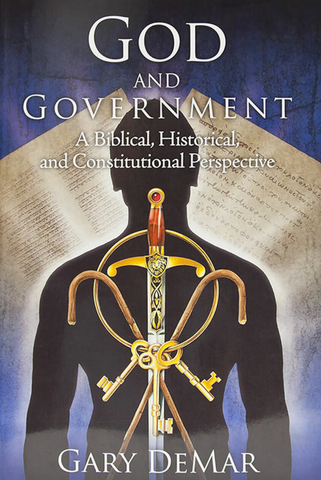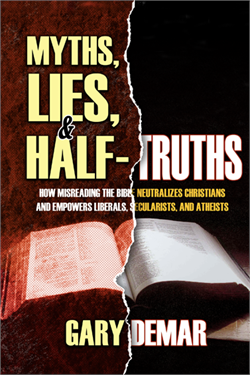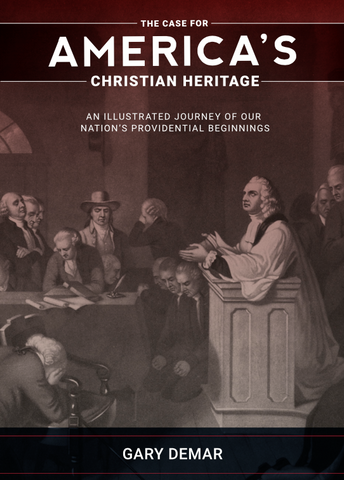Pastor John MacArthur denounced Christian nationalism insofar as it is defined as an attempt to usher in the Kingdom of God on Earth through political means. “There is no such thing as Christian nationalism,” MacArthur said during a question-and-answer period last month at Grace Community Church in Los Angeles. “The Kingdom of God is not of this world. Jesus said, ‘My kingdom is not of this world. If my kingdom were of this world, my servants would fight.’ His Kingdom is not of this world. The kingdom of this world is a separate world. They’re not linked together.”
As I’ve repeatedly said, I do not like the phrase “Christian Nationalism.” Christian Internationalism would be better. Christendom is also a good choice since God’s kingdom crosses all national boundaries. While God’s kingdom is not from this world; Jesus was not saying that His kingdom does not operate in this world. He told Pilate, “My kingdom is not of this realm” (John 18:36). He was referring to its point of origin, its source of authority and power. If Jesus’ kingdom was not operating in the world at that time, He would not have asserted His authority in judging Jerusalem or previously given “Jehoiakim king of Judah into [Nebuchadnezzar’s] hand” (Dan. 1:1-2). God certainly intervened in Egypt before the Exodus and later when He came to Egypt “riding on a swift cloud” (Isa. 19:1). He sent Israel and Judah into captivity, judged Nebuchadnezzar (4:28-37), and Belshazzar (5). God is not a passive bystander while kingdom usurpers try to ravage His kingdom.

God and Government
With a fresh new look, more images, an extensive subject and scripture index, and an updated bibliography, God and Government is ready to prepare a whole new generation to take on the political and religious battles confronting Christians today. May it be used in a new awakening of Christians in America—not just to inform minds, but to stimulate action and secure a better tomorrow for our posterity.
Buy NowIt’s hard to critique a word or phrase when it can be made and often is made to mean anything. We’ve even lost touch with what the word “Christian” means. How many times do we have to define the word when someone says, “and you call yourself a Christian”? Something similar happened when Jimmy Carter ran as a “born again Christian.” Billy Graham wrote a book with the title How to be Born Again?, first published in 1977. Nationalism has its own definitional problems. The Bible speaks about nations in terms of national inclusion in God’s present kingdom:
• After these things I looked, and behold, a great multitude which no one could count, from every nation and all the tribes, peoples, and languages (Rev. 7:9).
• “The gospel of the kingdom” was to “be preached in the whole world [oikoumenē] for a witness to all the nations” (Matt. 24:14; see Rom. 16:26). This was done in the first century (Rom. 1:8; 16:26 Col. 1:6, 23).
• “And Jesus came up and spoke to [His eleven disciples], saying, ‘All authority in heaven and on earth has been given to Me. Go, therefore, and make disciples of all the nations, baptizing them in the name of the Father and the Son and the Holy Spirit, teaching them to follow all that I commanded you; and behold, I am with you always, to the end of the age’” (Matt. 28:18-20).
The nations of the world are included in God’s kingdom. Even unbelievers are subjects in God’s kingdom. John the Baptist proclaimed, “The time is fulfilled, and the kingdom of God is at hand; repent and believe in the gospel” (Mark 1:15). Paul’s ministry was all about the kingdom even while under the civil jurisdiction of the Roman government:
Now Paul stayed two full years in his own rented lodging and welcomed all who came to him, preaching the kingdom of God and teaching things about the Lord Jesus Christ with all openness, unhindered (Acts 28:30-31).
The people in Paul’s day understood the “political” nature of the kingdom: “They all act contrary to the decrees of Caesar, saying there is another king, Jesus” (Acts 17:7). You don’t find Jason refuting that claim. It was true. But a belief in Christendom comes with kingdom rules and precepts. Christians are not revolutionaries. We don’t operate in this world using what Pilate had at his disposal (John 18:36). Pilate had authority over Jesus because “it had been given” to him “from above” (19:11). This could not have happened if God’s kingdom was not operational in the world.

Myths, Lies, and Half-Truths
Our nation is in a crisis. The world is crying out for answers in the face of bewildering and seemingly unsolvable problems. Myths, Lies, and Half-Truths shows that the Bible has real answers to these problems -- answers the church is currently ignoring.
Buy NowIn his book Why Government Can’t Save You, MacArthur opens the first chapter with a description of how things used to be:
There was a time when nearly everyone could name off all the Ten Commandments, but today most don’t know what the Ten Commandments are. There was also a time when retail stores, dining and entertainment establishments, and all nonessential enterprises would be closed on Sunday out of respect for the Lord’s day. But now for most people in the West it’s fairly much business as usual on Sundays. Furthermore, there was a time (not so many years ago), when respectable citizens uniformly disapproved of homosexuality, adultery, and divorce; believed sexual promiscuity was absolutely wrong; disdained cursing or obscene language; saw abortion as unthinkable; and automatically held public officials to high moral and ethical standards. But today many citizens, when polled on such issues, view them either as acceptable practices, civil rights, or inconsequential matters.[1]
“There was a time….” Why was there a time? Because Christians took their faith seriously and applied it beyond the church doors and the Sunday school hour. America was a beacon to the world, and still is, because of how Christians applied their faith to every area of life. Those who came here from other countries understood that America was a Christian nation in terms of faith and practice. In fact, the case could be made that America’s public display of faith is what attracted so many to our shores.
Let’s not forget that there are kingdom usurpers, just like there are usurpers in the church. The government of the church is not denied because of them. It’s established. Paul warned the Ephesian elders that “savage wolves will come in among you” (Acts 20:29). John mentions “antichrists”: “They went out from us, but they were not really of us; for if they had been of us, they would have remained with us; but [they went out], in order that it might be shown that they all are not of us” (1 John 2:19). The reality of the church and its government remains even when there are antichrists among believers. The church is a government with leaders, laws, and sanctions. It’s no less true in God’s comprehensive kingdom including the civil sphere.

The Case for America's Christian Heritage
It’s not enough to relive history. There’s much work before us to reset the foundation stones of a firm reliance on Divine Providence. We need to heed the words of Benjamin Franklin who quoted Psalm 127:1 during the drafting process of the Constitution: “except the Lord build the house they labor in vain that build it,” and “that without His concurring aid we shall succeed in this political building no better, than the Builders of Babel.” The principles that were true and necessary centuries ago for building nations are equally true and necessary today.
Buy Now[1] John MacArthur, Why Government Can’t Save You: Alternative to Political Activism (Nashville, TN: Word Publishing, 2000), 3-4.

